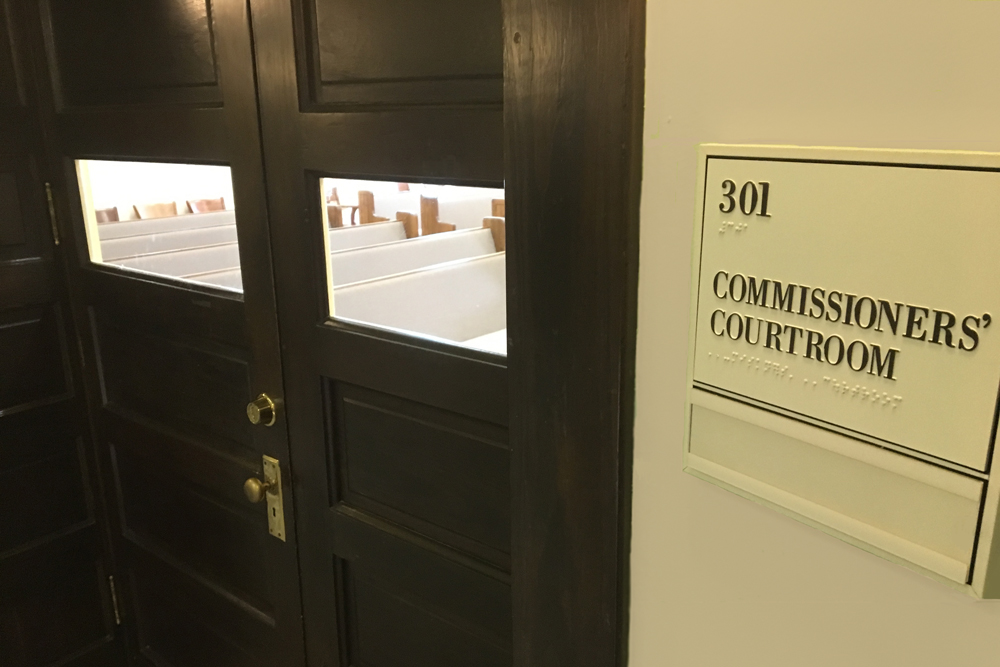
Commissioners Court Table Decision On Grant For Public Defender’s Office
By, Terra Rivers, Managing Editor
The Hays County Commissioners Court held a special meeting on Friday afternoon to consider the submission of a grant application to the Texas Indigent Defense Commission, which ultimately failed to garner the support of commissioners.
The grant was the first step in the process of establishing a public defenders office in Hays County and was due by 5 PM Friday, May 10. According to the agenda, the Judge’s grant submission would include adding a Mental Health Attorney, Padilla Attorney, Council at Magistration and supporting staff.
Hays County Chief of Staff, Alex Villalobos, said, “Across the state of Texas 20 percent of all Texas jails house individuals with some type of mental health critical issue or issue in general; for [Hays County], that’s anywhere from 93 to 186 inmates with felonies, 95 to 190 misdemeanors.”
Villalobos said the county spends over approximately $10 million for inmates on felony charges with mental health issues and over approximately $11 million for inmates on misdemeanor charges annually.
“So, this is an opportunity to at least mitigate the expense utilizing a very narrowly scoped,” program and “with the guidance of every level of our judiciary that has helped us guide this together,” Villalobos said.
Villalobos said on Tuesday the county was not obligated to continue the grant program beyond a year if the Public Defender’s Office proved ineffective in mitigating Hays County’s issues.
Several people spoke in favor of the establishment of a Hays County Public Defenders Officer. However, some voiced concerns that the county didn’t have all the information and the level of participation from the major stakeholders to make a decision.
“I think it’s pertinent that we thank Judge Becerra and his chief of staff, Alex Villalobos, for bringing this initiative forward,” Roland Saucedo, Hays County resident, said. “However, I still feel the same way that I did on Tuesday; I am still asking that this court table this item at least until the first meeting in January 2020 due to the fact that I don’t believe that we have a comprehensive plan in place.”
Saucedo told Commissioners this was a critical issue and that he believed the major stakeholders such as in the judicial courts, the Hays County Criminal Defense Bar and the magistrates should be involved.
Geoffrey Burkhart, executive director of the Texas Indigent Defense Commission, said the application does require a “critical mass” of local judiciary members to sign a document of support but is kept vague somewhat intentionally.
“We’re not looking for signatures to a person, to have every single judge to a county,” Burkhart said.
Burkhart said that the state doesn’t want to provide money for the office if it’s something that won’t be used by the local judiciary. The board, which reviews all of the applications, would therefore not support an application that did not include a letter or document from members of the county’s judiciary branch showing support for the office.
Commissioners Lon Shell, Mark Jones, Smith and Debbie Ingalsbe-Gonzales shared a consensus of wanting the support of the county’s judiciary branch and the bar association before they could support the item.
Commissioner Walt Smith said he had spoken with all of the county’s judges and had yet to find anyone who would sign a document showing support to be included in the application; Smith also said he received a letter from the president of the Hays County Bar Association, who had not been contacted regarding the PD office but would love to collaborate on the issue.
Commissioner Ingalsbe-Gonzales said she took the time to speak with each county court at law judge, each district judge and each justice of the peace.
“Everyone that I spoke to was supportive of the program,” Ingalsbe-Gonzales said, “Felt that they wanted to be a team player, wanted to know how this process would affect their office or what it would do, what role they would be playing. So overall, a lot of support came out of those discussions; although, many of them said they hadn’t been a part of those discussions to move this program forward, and they’d like that opportunity.”
Hays County Court-At-Law #3 Judge, Tacie Zelhart, read a statement to the court from District Judge of District 274, Gary Steel.
“I have talked with all the district court judges and the county court at law judges,” Judge Steel wrote, “And although we support the ideas presented, we feel we do not have enough information on the Public Defender proposal to make a decision one way or the other.”
“We’re here to consider the grant application,” Shell said. “I don’t think we’re here to deny the creation of a Public Defender’s office or not do anything else. I support these issues brought up in this grant application; I do not believe this is the best program to address them. It may be. If all the stakeholders say that it is, then that is what we will do, and we will make it work.”
A motion to approve the application was made but received no support from commissioners to call for a vote. However, commissioners did not vote to deny the approval of the grant application either.
“I’ve spoken to each of you personally; I know you do care. You care about the people; you care about the issues, and you want to do the right thing,” Zelhart said. “I love your passion; it matches mine. But I know that you want to make the right decision with the right information, and you want to make an educated decision. You shouldn’t be forced to make a quick decision or a hasty decision. You should have all the information in front of you. I know our jail is overcrowded. A public defender’s office is not going to clear out your jail.”
Related Articles:






